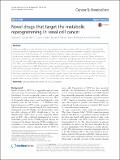| dc.contributor.author | van der Mijn, Johannes C. | en_US |
| dc.contributor.author | Panka, David J. | en_US |
| dc.contributor.author | Geissler, Andrew K. | en_US |
| dc.contributor.author | Verheul, Henk. M. | en_US |
| dc.contributor.author | Mier, James W. | en_US |
| dc.date.accessioned | 2016-08-09T14:53:07Z | |
| dc.date.issued | 2016 | en_US |
| dc.identifier.citation | van der Mijn, Johannes C., David J. Panka, Andrew K. Geissler, Henk. M. Verheul, and James W. Mier. 2016. “Novel drugs that target the metabolic reprogramming in renal cell cancer.” Cancer & Metabolism 4 (1): 14. doi:10.1186/s40170-016-0154-8. http://dx.doi.org/10.1186/s40170-016-0154-8. | en |
| dc.identifier.issn | 2049-3002 | en |
| dc.identifier.uri | http://nrs.harvard.edu/urn-3:HUL.InstRepos:27822249 | |
| dc.description.abstract | Molecular profiling studies of tumor tissue from patients with clear cell renal cell cancer (ccRCC) have revealed extensive metabolic reprogramming in this disease. Associations were found between metabolic reprogramming, histopathologic Fuhrman grade, and overall survival of patients. Large-scale genomics, proteomics, and metabolomic analyses have been performed to identify the molecular players in this process. Genes involved in glycolysis, the pentose phosphate pathway, glutamine metabolism, and lipogenesis were found to be upregulated in renal cell cancer (RCC) specimens as compared to normal tissue. Preclinical research indicates that mutations in VHL, FBP1, and the PI3K-AKT-mTOR pathway drives aerobic glycolysis through transcriptional activation of the hypoxia-inducible factors (HIF). Mechanistic studies revealed glutamine as an important source for de novo fatty acid synthesis through reductive carboxylation. Amplification of MYC drives reductive carboxylation. In this review, we present a detailed overview of the metabolic changes in RCC in conjunction with potential novel therapeutics. We discuss preclinical studies that have investigated targeted agents that interfere with various aspects of tumor cell metabolism and emphasize their impact specifically on glycolysis, lipogenesis, and tumor growth. Furthermore, we describe a number of phase 1 and 2 clinical trials that have been conducted with these agents. | en |
| dc.language.iso | en_US | en |
| dc.publisher | BioMed Central | en |
| dc.relation.isversionof | doi:10.1186/s40170-016-0154-8 | en |
| dc.relation.hasversion | http://www.ncbi.nlm.nih.gov/pmc/articles/PMC4944519/pdf/ | en |
| dash.license | LAA | en_US |
| dc.subject | Warburg | en |
| dc.subject | Renal cell cancer | en |
| dc.subject | HIF | en |
| dc.subject | MYC | en |
| dc.subject | Glutamine | en |
| dc.title | Novel drugs that target the metabolic reprogramming in renal cell cancer | en |
| dc.type | Journal Article | en_US |
| dc.description.version | Version of Record | en |
| dc.relation.journal | Cancer & Metabolism | en |
| dash.depositing.author | Panka, David J. | en_US |
| dc.date.available | 2016-08-09T14:53:07Z | |
| dc.identifier.doi | 10.1186/s40170-016-0154-8 | * |
| dash.contributor.affiliated | Panka, David | |
| dash.contributor.affiliated | Mier, James | |


